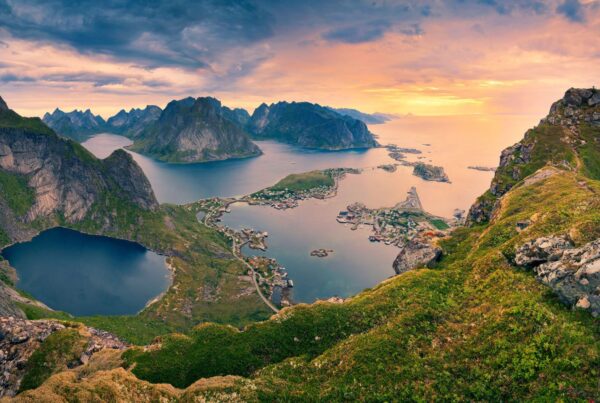As travellers become more aware of their environmental impact and communities battle to protect their cultural and natural resources, sustainability has been permanently taken off the backburner in the tourism industry.
The demand for sustainable tourism practices has become more urgent than ever.
And while the need to balance the economic benefits of tourism with the well-being of local residents and environmental preservation is widely acknowledged, destinations still face the significant challenge of how to achieve it.
This blog explores various facets of sustainable tourism, highlighting leading industry practices and innovative strategies such as those employed by cities like Amsterdam and Florence — all discussed during our webinar with the European Tourism Association (ETOA), Making Green Choices Without Turning Blue!

Why sustainable tourism matters
Sustainability isn’t a 21st century marvel.
Its roots trace back to 1972 at the UN Conference for the Human Environment, the first global conference on environmental issues, which highlighted the importance of balancing development with environmental preservation.
Since then, sustainability has evolved to encompass diverse concerns such as environmental protection, cultural preservation, and economic resilience.
For the travel industry, sustainability means adopting practices that minimise the negative impacts of travel while maximising the benefits for both visitors and residents. This includes adopting practices that reduce carbon footprints, conserve natural resources, and support local communities.
And the industry seems to be on the right track, as stated by Mirko Lalli, Founding CEO at Data Appeal during the webinar.
”The travel industry indeed seems to be on the right path. Not every destination in the world, and not all travellers…Like any innovation or market advance, there are always some areas that are left behind.
Mirko LalliFounding CEO at Data Appeal
It’s not just the planet that reaps the benefits of sustainable tourism.
Adopting sustainable practices can enhance the travel experience by preserving the natural beauty and cultural heritage that attract visitors in the first place.
It also ensures that tourism can continue to be a viable economic driver without compromising the needs of future generations.
As travellers become more eco-conscious, destinations that prioritise sustainability will not only attract more visitors but also create a more harmonious coexistence between tourists and local communities.
What steps is the travel industry currently taking to promote sustainability?
- The aviation sector is exploring sustainable fuels and implementing measures to offset its environmental impact. Airlines are increasingly focusing on reducing carbon emissions through improved fuel efficiency and the use of biofuels.
- In the hospitality industry, hotels are implementing water conservation measures, reducing CO2 emissions, and minimising waste. Energy-efficient technologies, locally sourced goods, and robust recycling programs are becoming standard practices to enhance sustainability.
- The European Union has introduced stringent regulations against greenwashing, requiring companies to obtain third-party certifications to validate their eco-friendly claims. This ensures transparency and credibility in sustainability initiatives.
- Consumer behaviour is also evolving, with younger generations showing a strong preference for sustainable travel options. Tools like Google Flights now allow users to filter flights based on their carbon footprint, enabling travellers to make more informed and environmentally friendly choices.

Destinations at the forefront of sustainable travel initiatives
While the journey towards achieving true sustainability in the travel industry is often considered lengthy, a number of destinations are already pioneering and reaping the results through their proactive actions.
Amsterdam
Amsterdam is actively managing tourism sustainability.
So far, the city:
- Reduced short-term flights by 133% at Amsterdam Airport Amsterdam
- Promotes rail travel
- Launched campaigns to educate tourists on respectful behaviour, including a quiz to guide visitors towards more sustainable choices.
Bhutan
Bhutan balances economic growth with environmental preservation by using tourism as a sustainable development tool.
The government has implemented a daily fee for tourists, ensuring tourism contributes positively to the economy and environment.
Venice
Venice has introduced entry fees for tourists to manage overcrowding and preserve its heritage.
Despite some local opposition, the initiative has achieved its financial goals swiftly, indicating positive results.
Florence
Florence has launched initiatives focused on balancing tourism with resident needs.
Urban requalification projects aim to distribute tourism beyond the historic centre, investing in less-visited areas and developing quality tourism products.
Regulations now limit new short-term rentals in UNESCO Heritage areas to maintain a balance between tourists and residents.
Strategies for sustainable tourism – The case of Florence
Florence is one of the cities battling overtourism, grappling with the challenge of managing a high volume of visitors while preserving its cultural and historical heritage.
Carlotta Ferrari, President of the Florence Convention Bureau, shared her insights during the webinar on implementing sustainable tourism initiatives, emphasising the necessity for collective collaboration to achieve common goals.
”The problem is bigger than a problem that can be managed by a DMO, and in Italy, we have several problems about that. Over-tourism is a phenomenon that has to be managed by a team of people composed by the destination manager and the municipality and the region and the state. We have to consider not only from a destination manager point of view, but we need a more holistic point of view, we need the urban strategy, we need economic strategies.
Carlotta FerrariPresident of the Florence Convention Bureau
Some of the most tangible initiatives and successful approaches taken by Florence:
Urban requalification
Florence is heavily investing in urban requalification projects to distribute tourism more evenly across the city. Significant investments are being made in less-visited areas, with projects like Manifattura Tabacchi to develop quality tourism products and improve infrastructure.
Product development
The city collaborates with local operators, selecting and training them to develop these new offerings to create high-quality tourism products that highlight less-visited areas. Improved transportation infrastructure, including a new tram system and bicycle paths, supports this effort.
Regulation of short-term rentals
Florence has implemented regulations to limit new short-term rentals in UNESCO Heritage areas. This measure helps preserve the residential character of these neighbourhoods and prevents the displacement of locals.
Collaborative campaigns
#EnjoyRespectFirenze is an educational campaign to promote sustainable visitor behaviour, with the aim to inform tourists about respectful and environmentally-friendly practices. This campaign involves various stakeholders, including the museum system, transportation services, and local businesses.
Florence: Analysing the impact of the initiatives implemented
We consulted our all-in-one destination management platform D / AI Destinations to analyse the impact of the initiatives mentioned above.
More specifically, we looked at any variations in the Destination Sustainability Index – a proprietary index which measures the sustainability of any destination any given time and even allows comparison to other time frames.
The index is measured through figures for four pillars:
- Socio-cultural pillar
- Destination management pillar
- Overtourism pillar
- Environmental pillar
Each one of these pillars encompasses various sub-pillars covering all sustainability aspects — with the Inclusivity Index specifically showing the inclusivity of the destination.
Here’s what we discovered when comparing data from May 2024 with that of May 2023.
Improved Tourism Pressure Index
The score of 83.9 reflects a sustainable impact of tourist flows on the host community, underscoring a commitment to preserving the destination’s well-being. The emphasis remains on ongoing enhancement and maintaining high standards for sustainable development.
Source: D / AI Destinations
The LGBTQ+ index shows the biggest improvement
The LGBTQ+ Index (now Inclusivity Index) has improved by +13.5 points when compared to last year, which is a significant achievement as it signifies progress towards creating more inclusive and supportive environments for LGBTQ+ travellers, enhancing overall destination sustainability efforts.

Source: D / AI Destinations
As the tourism industry evolves, the adoption of sustainable practices becomes essential for balancing economic growth with environmental preservation and community well-being.
For more in-depth insights and detailed discussions on sustainable tourism practices, you can watch watch the full webinar.
Stay in the know
Stay up-to-date with the latest news tailored to your industry!
Subscribe to our newsletter to receive monthly research, eBooks, industry updates, data-driven reports and more.






